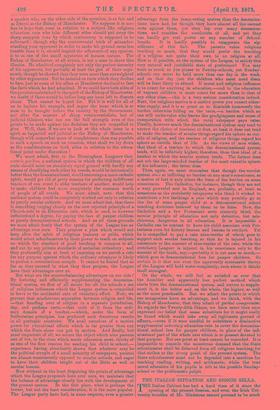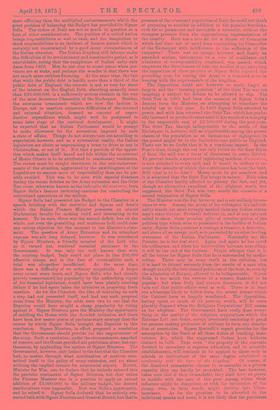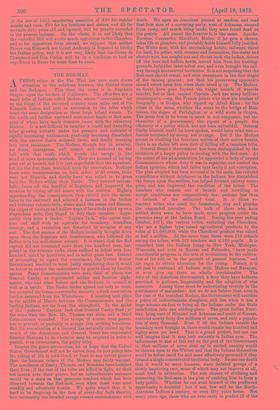THE ITALIAN SITUATION AND SIGNOR SELLA.
rpHE Italian Cabinet has had a hard time of it since the JL opening of the present Session, and even the Irish Uni- versity troubles of Mr. Gladstone Cannot pretend to be much more afflicting than the multiplied embarrassments which the great problem of balancing the Budget has provided for Signor Sella. The riches of Italy are not so much in question as a host of other considerations. The position of a united nation brings responsibilities as well as rank, and the temptation to shirk responsibilities is an incident of human nature which is certainly not counteracted by a good many circumstances of the Italian situation. The Italian kingdom still labours under the difficulties of its revolutionary and constructive period, as is unavoidable, seeing that the completion of Italian unity only dates from 1fl70. Men do not stay to count pence when pro- vinces are at stake, and perhaps the wonder is that there was not much more reckless financing. At the same time, the fact that while the public debt is hardly more than a third of the public debt of England, the interest is not so very far short of the interest on the English Debt, absorbing annually more. than £20,000,000, is a sufficiently serious obstacle in the way of the most dexterous Chancellor of the Exchequer. Besides, the enormous armaments which are now the fashion in Europe, not to mention numerous difficulties of the internal and external situation, demand an amount of unpro- ductive expenditure which might well be postponed to some later stage of the national development. It might be expected that an Italian Parliament would be prompt to make allowance for the necessities imposed by such a state of affairs. Things do not always turn out according to expectation however, and as a substantial reality, the Italian legislators are about as unpromising a team to drive as any in Christendom, or out of it. Not that a particle of the opposi- tion which makes itself heard and felt within the ex-convent of Monte Capri° is to be attributed to reactionary tendencies. The reason must be sought elsewhere, in the real embarrass- ments of the situation, aggravated by the unwillingness of the Legislature to assume more of responsibility than can be pos- sibly avoided. This was to be seen with especial clearness during the recent debates on the Army extension and the Grist Tax crisis, otherwise known as the imbroglio del contatore, from Signor Sella's famous reckoning-machine for controlling the contraband operations of the millers.
Signor Sella had presented his Budget to the Chamber in a speech bristling with the •statistics and figures and details which the Italian Finance Minister possesses an almost Gladstonian faculty for making lucid and interesting to his hearers. To be sure, there was the annual deficit, but on the whole, not even the grumbling and mutinous Left could raise any serious objection for the moment to the Minister's state- ment. The question of Army Extension and its attendant expense was not long delayed, however. It was introduced by Signor Nicotera, a friendly member of the Left who, as it turned out, rendered essential assistance to the Government. It was only too well known that with the existing budget, Italy could not place in line 200,000 effective troops, •and in the face of eventualities such a total was altogether insufficient. At the same time, there was •a difficulty of no ordinary magnitude. A larger army meant more taxes, and Signor Sella, who had already gravely compromised his popularity by the unflinching vigour of his financial legislation, would have been plainly courting failure if he had again taken the initiative in proposing fresh taxation. As for the Chamber, the idea of venturing on such a step had not presented itself, and had any such proposal come from the Ministry, the odds were two to one that the Deputies would have sought a cheap popularity by voting against it. Signor Nieotera gave the Ministry the opportunity of saddling the House with the dreaded initiative, and there have been few neater pieces of parliamentary strategy than the course by which Signor Sella brought the Deputies to this conclusion. Signor Nicotera, in effect, proposed a resolution that the Government should provide for the improvement of the army. Such a resolution, under the circumstances, smacked of censure, and the House gratified not patriotism alone, but cap- tiousness, by applauding the motion of Signor Nicotera. The Government, however, only looked to the fact that the Chamber had, no matter through what combination of motives, com- mitted itself to the policy of army extension, and set about utilising the implied censure for ministerial objects. Ricotti, Minister for War, rose to declare that he entirely entered into the patriotic 'sentiments of Signor Nicotera, but that unless the Finance Minister was in a position to apply an annual addition of £2,000,000 to the military budget, the desired ameliorations were impossible. Now was Sella's opportunity, and he seized it. Signor Sella declared that he entirely con- curred both with Signor Nicotera and General Ricotti, but that in
presence of the overtaxed population of Italy,he could not think of proposing so sensible an addition to the popular burthens, even for so paramount and inevitable a necessity, without the strongest pressure from the magnanimous representatives of the country. Here was a nice fix for a House of Commons which had time out of mind been reproaching its Chancellor of the Exchequer with indifference to the sufferings of the taxpayers ! There was no escape, however, and finally an amended motion, tantamount to a vote of confidence and admission of co-responsibility combined, was passed, which empowers the Government to take the needful steps, including the imposition of three projects of Signor Sella rejected the preceding year, for raising the Army to a standard more in keeping with the requirements of the kingdom.
The Opposition could not, however, so easily forget or forgive, and the " burning question " of the Grist Tax was too tempting a subject for debate to be allowed to slip. The Grist Tax in 1865 had been the occasion of Signor Sella's descent from the Ministry, on attempting to introduce the hateful tax in that year. In 1869 Signor Sella returned to power, and with him returned the Grist Tax, which has gradu- ally increased in productiveness until it has resulted in bringing in the respectable sum of £2,500,000 during the past year. The Grist Tax, though indispensable to the needs of the Exchequer, is, however, still as objectionable among the poorer classes of the population as an income-tax of eightpence in the pound might be to the limited-income public in England. There can be no doubt that it is a vexatious impost. In the Pope's time, though the tax was only levied on the finer kinds of flour, the mill was a focas of discontent in every district. To prevent frauds, a species of registering machine, it contatore, is now attached to every mill, and it would be endless to re- count the assaults of which this contrivance has been the butt. Still what is to be done ? Money must be got somehow, and it is admitted that the Grist Tax brings in money. Both sides of the Chamber hardly affected to gainsay the fact, and yet, though no alternative expedient of the slightest worth was suggested, the Grist Tax was very 'nearly the occasion of a second resignation of Signor Sella.
The Minister won the day, however, and is not unlikely to con- tinue to win. Among the group of his colleagues, his individ- uality stands out more strongly marked than any Italian states- man's since Cavour. Probably deficient in, and at any rate not oalled to show, those peculiar gifts of creative genius of the political type which were so prominent in the builder of Italian unity, Signor Sella possesses a courage, a tenacity, a dexterity, and above all an energy, such as is presented by no other leading statesman of the Italian Parliament. Nominally not the Premier, he is the real chief. Again and again he has saved his colleagues, and when his intervention becomes unavailing, it will be the end of the Cabinet. People whisper that it is all the better for Signor Sella that he is surrounded by medio- crities. There may be some truth in the criticism, but it is hard to detract seriously from the merits of a man who, though usually the best abused politician of the hour, is, even by the admission of Ratazzi, allowed to be indispensable. Signor Sella is too much the reverse of a roseate financier to be popular ; but when Italy had roseate financiers, it did not turn out that public affairs went as well. There is at least one advantage likely to follow from the recent storms which the Cabinet have so happily weathered. The Opposition, having spent so much of its pent-up wrath, will be more placably disposed when the Religious Corporations' Bill comes on for adoption. The Government have really done every- thing in the matter of the religious corporations which the Extreme Left can desire, except absolutely rendering it penal for persons making profession of celibacy to form any descrip- tion of association. Signor Restrelli's report provides for the assumption by the State of all those duties of teaching, bene- volence, &c., which the suppressed Orders have hitherto claimed to fulfil. Thus even "the property of the convents devoted to secondary or superior education, and to scientific establishments, will continue to be applied to these ends in schools or institutions of the same degree established in conformitg with the laws of the kingdom." Of course, if the dissolved monasteries choose to re-assemble in a private capacity, they can hardly be prevented. The law, however, takes care that if they re-assemble, they shall have no power to meddle with the care of the poor, among whom their influence might be dangerous, or with the instruction of the young, who, in their hands, might develop into Ultra- montanes. As for the pensions to be allocated to the individual monks and nuns, it is not likely that the provisions of the law of 1865, appointing annuities of £20 for regular monks and nuns, £10 for lay brothers and sisters, and £5 for servants sixty years old and upward, will be greatly exceeded in the present instance. On the whole, it is not likely that the amended Bill will excite much opposition in the Chamber, and as for opposition from abroad, we suppose that neither Prince von Bismarck nor Count Andrassy is disposed to hinder the Italian policy, and it is not very likely that the Count de Chambord and Don Carlos will be in a condition to lead an expedition to Rome for some time to come.




































 Previous page
Previous page